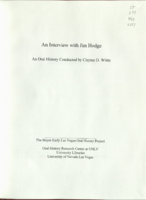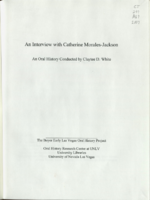Search the Special Collections and Archives Portal
Search Results
Transcript of interview with Count Guido Roberto Deiro by David G. Schwartz, January 30, 2002
Date
Archival Collection
Description
Count Guido Roberto Deiro, born in Reno, Nevada, in 1938, has had several fascinating careers. The son of vaudeville performer and recording star Count Guido Pietro Deiro, who was the first major piano-accordionist to become popular in the United States, and his teenage wife Yvonne Teresa LeBaron De Forrest, Deiro grew up in and around Las Vegas and Southern California after his parents' 1941 divorce. After attending 13 grammar schools and five high schools, Deiro graduated from Las Vegas High School in 1955. During his youth, thanks to his stepfather Samuel "Baby Shoes" Prezant, Deiro had an early introduction to the Las Vegas gambling scene. Following a brief stint in the U.S. Army, Deiro worked a series of jobs, including parking cars, selling shoes, and driving an ambulance. He transitioned from working as a fitness instructor to being a lifeguard at the El Rancho Vegas hotel, all the while becoming interested in aviation. Deiro entered the gaming industry at the age of 19 and a half, when he began working as a dealer, having been taught by his stepfather. Breaking in at the Nevada Club, Deiro, who became known as "Bobby Blue Eyes," later worked at the New Frontier, Sands, El Cortez, and Holiday casinos. He provides a great deal of detail about the social world of Las Vegas casinos in the 1950s through the 1970s, with insight into many major personalities. While working in gaming, Deiro continued to pursue a career in aviation, acquiring in the early 1960s a commercial pilot license, instrument rating and instructor's certificate. He began working as a flight instructor and charter pilot at Thunderbird Field, now known as North Las Vegas Air Terminal. Deiro flew around the United States promoting Las Vegas and the airfield. After Howard Hughes purchased the airfield in 1967, Deiro stayed, ultimately becoming Director of Aviation Facilities for the Hughes Tool Company. Following his marriage to Joan Marlene Calhoun, Deiro moved to California, where he became Vice President and Director of Administration for Air California and Golden West Airlines, before serving with other companies owned by C. Arnholdt Smith. In 1971, Deiro returned to Las Vegas. Deiro then met artist Michael Heizer, who enlisted Deiro's help in scouting and securing locations for his Earth art installations. This led to Deiro's long involvement with that genre. In addition to these careers, Deiro was also influential in many key developments in Las Vegas, including the construction of the Las Vegas Motor Speedway and, with his wife Joan, several philanthropic endeavors. In this interview, Deiro shares his perspectives on his times and his impact on Las Vegas.
Text

Transcript of interview with Jim Hodge by Claytee White, April 13, 2009
Date
Archival Collection
Description
Jim Hodge describes an active and success filled life in this narrative. Born and raised in the South, Jim enlisted in the Navy at the young age of 17, just as World War II was winding down. His primary job was that of a cook. He became smitten with the life of an entertainer after participating in a play and headed for Hollywood in 1952. It was there that he auditioned for Donn Arden, who organized and directed Las Vegas shows. Though he didn't get the part, he did get hired to be a singer for a show featuring Betty Grable. Thus his career was launched and would span the heyday of Las Vegas entertainment from the 1950s to the 1970s. Jim talks about the people, shows and places that touched his life. He also offers thoughts about the changes in the Vegas entertainment scene as well as shares his relationship with his church over the past 40 years.
Text

Transcript of interview with Cathy Morales-Jackson by Claytee White, May 5, 2010
Date
Archival Collection
Description
Catherine (Cathy) Morales-Jackson grew up in the suburban tranquility of Hazlet, New Jersey, with five siblings, a stay-at-home mom and her father, who served the community as mayor and as a school board member. In 1981, "on the day Princess Diana go married," Cathy moved to Las Vegas with her boyfriend/future husband and her mother-in-law. Life in Las Vegas was distinctively different than living in New Jersey she explains. For the next 15 years, they lived at Delta Gardens apartments on Paradise. She started working at UNLV's library as it was moving into a new building. He first position was in the periodicals and microfilm area and in binding. She contrasts both details of the campus and the city then with how it is today. At the time of this interview, Cathy was taking an early retirement at the age of 51. She provides a retrospective of a range of library topics: from the thousands of volumes she bound to the move to Lied Library, from a Celebrity Pancake fundraiser to staff parties, and from the implementation of a campus parking fee to the various library organizations that she has belonged to over the years. Cathy loved her years in the university libraries and feels that the current budget crises is the biggest change she has witnessed. Retirement came at an opportune time for her, but she worries about the future for others.
Text

Transcript of interview with Steve Riback by Barbara Tabach, December 12, 2017
Date
Archival Collection
Description
Sgt. Steve Riback is a Detective Sergeant for the Las Vegas Metropolitan Police Department. He has been with the police force for nearly twenty years. On the night of the Route 91 Harvest festival shooting, he had just returned home shortly after 10pm. He had been on an overtime assignment at the Golden Knights hockey game at the T-Mobile prior to the shooting. When he was abruptly awaken by a call from his lieutenant, he was oblivious to the time and immediately rushed into action—contacted his squad members and sped to his station in northwest part of the city. He reflects on his overwhelming pride of the police that day, recalling what he heard on his police radio, seeing the rush of police cars being dispatched, and watching a body camera video later. Sgt. Riback’s squad was assigned to Spring Valley Hospital where they worked tirelessly to identify victims, both injured and deceased. His reflections stir the image of medical professionals and police officers urgently fusing together to handle the situation at hand. Riback shares a myriad of emotions, talks about the options available for officers to deal with their personal trauma, and how he explained to his eight-year-old why Daddy was crying. Riback is also known as the Kosher Cop and has authored a book, My Journey Home, about becoming an observant Orthodox Jewish officer and his struggle for the right to wear his beard and a yarmulke while on duty.
Text

Transcript of interview with Kenny Epstein by Barbara Tabach, May 1, 2015
Date
Archival Collection
Description
On a pleasant spring evening at sundown in April 2017, a Pop-Up Shabbat draws a crowd of Jews to the Jackie Gaughan Parkway at the El Cortez Hotel & Casino. Proudly, and quietly, watching from the sideline is Kenny Epstein, owner of the El Cortez. He seeks no recognition, but is enjoying the gathering for Sabbath services and the music that will fill the air. Kenny Epstein is also a classic enthusiast of Las Vegas history. The nostalgia is evident as one walks through the casino and reinforced by the stories of a man who has experienced the city’s growth since moving here in 1959 at the age of 18. The timeline of Kenny’s teen years begins with his bar mitzvah in Chicago and a story of prizefighter Rocky Marciano giving a brief toast. When he was 15, his parents, Ike and Adele Epstein, took the family to visit Las Vegas. About three years later, his father became an executive at the Stardust. Kenny’s own imprint on Las Vegas history was just beginning. In this brief interview, he mentions an illustrious list of mentors and recalls many historic moments from the history of the Las Vegas Strip. All of which led to his ownership of The El Cortez—advertised as the longest continuously operating hotel/casino.
Text

Chester Hodson interview, March 4, 1981: transcript
Date
Archival Collection
Description
On March 4, 1981, collector Marlene L. Larson interviewed Chester Albert Hodson, Jr. (born December 21st, 1948 in Las Vegas, Nevada) at the Sizzler restaurant in Las Vegas, Nevada. In this interview, Mr. Hodson speaks about working in the restaurant industry in Las Vegas, as well as his father’s experience working in the industry. He also talks about living in Las Vegas and the changes he has seen throughout his life.
Text

Transcript of interview with Ruth Urban by Barbara Tabach, August 24, 2015 and September 16, 2015
Date
Archival Collection
Description
In this interview, Urban discusses her upbringing in Las Vegas, and childhood friendships, many which came from within the Jewish community. She talks extensively about her professional career and passion for mediation as a strategy for problem-solving. In addition, Urban describes her community service commitments over the years, including her current role with Nevadans for the Common Good. Urban married Andrew Urban Jr. in 1983, and the couple have a son, Andrew Urban III.
Text

Transcript of interview with Gilbert Shaw by Barbara Tabach, May 3, 2016
Date
Archival Collection
Description
In this interview, Gil Shaw recalls milestones at Congregation Ner Tamid?first bat mitzvah?and anecdotes about leaders, first rabbis, donation by Moe Dalitz, services being held in Protestant churches, and even a controversy over colors for the new temple building of Ner Tamid.
Text

Transcript of interview with Priscilla Schwartz by Barbara Tabach, June 16, 2016
Date
Archival Collection
Description
In this interview, Schwartz talks at length about her passion for compassionate hospice care, and her broad involvement with the Nathan Adelson Hospice, from volunteering to serving on the board to philanthropy, which included opening the Walter Schwartz Center for Compassionate Care. Schwartz also talks about other philanthropic giving which includes establishing scholarships at George Washington University and University of Michigan as well as support to Temple Beth Sholom gift shop.
Text

Transcript of interview with Doug Unger by Barbara Tabach, August 26, 2014
Date
Archival Collection
Description
Interview with Doug Unger by Barbara Tabach on August 26, 2014. In the interview, Unger discusses his schooling, his family's mattress business, and his endeavors in the company and the mattress industry in Las Vegas. Unger becomes involved in Holocaust education and the Sperling Kronberg Mack Holocaust Resource Center.
Doug Unger was born in Cleveland, Ohio, and grew up working summers in a mattress factory, a family business started by his maternal grandfather. After graduating from high school in Cleveland, Doug attended the University of Cincinnati until moving to Steamboat Springs, and enrolled in Denver University, though ended his college career one class away from graduation. Eventually, Unger moved back to Cleveland, then to Las Vegas. In 1976, Dough bought Supreme Mattress and moved to Las Vegas to build his new business. Outside his successful career, Doug was always an active member in the city's Jewish community. He joined Congregation Ner Tamid, where he was a trustee. He became involved with the Jewish Federation, serving as treasurer and later as president. When he moved to Reno, Doug joined Temples Sinai and Emanu-el, and also became heavily involved with Guide Dogs for the Blind Friends Committee, serving as its director for a period of time. He was also the co-chair of the Governor's Advisory Council on Education Related to the Holocaust (GAC). Doug was instrumental in establishing the Library for Holocaust Studies as a successful organization, independent of the Jewish Federation. The Library is now located in its own, donated space, run by trained staff, and receives $200,000 from the state biennially.
Text
